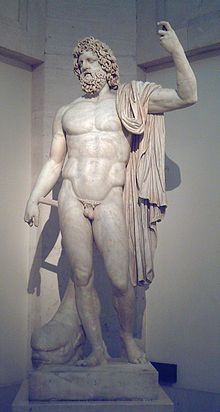
Back Neptunus (mitologie) Afrikaans Neptunus ALS Neptuno (mitolochía) AN نيبتون (أسطورة) Arabic نبتون (اله) ARZ Neptun (mifologiya) Azerbaijani Нептун (міфалогія) Byelorussian Нептун (митология) Bulgarian নেপচুন (পুরাণ) Bengali/Bangla ཉི་ཕུའུ་ཏུན། Tibetan
| Neptun | |
 | |
| Statuia lui Neptun de la Muzeul Prado din Madrid. | |
| Civilizația | mitologie romană Religia în Roma antică |
|---|---|
| Căsătorit cu | Salacia Thetis Amfitrita Venilia[*][1] |
| Urmași | Halaesus[*] Leucon[*] Triton |
| Tată | Saturn |
| Bunic | Caelus |
| Bunică | Tellus |
| Frați | Vesta Pluton (mitologie) Jupiter Ceres Iuno |
| Modifică date / text | |
Neptun (în latină Neptūnus,Poseidon [nɛpˈtuːnʊs]) a fost zeul apelor și mărilor[2] în religia romană. El este omologul zeului grec Poseidon.[3] Potrivit tradiției de influență grecească, Neptun era fratele lui Jupiter și Pluto; frații stăpâneau Cerul, lumea pământească și lumea subterană.[4] Salacia a fost soția lui.
Reprezentările lui Neptun în mozaicurile romane, mai ales cele din Africa de Nord, sunt influențate de convențiile elenistice.[5] Neptun a fost probabil asociat inițial cu izvoarele de apă dulce.[6] La fel ca și Poseidon, Neptun a fost venerat de romani ca un zeu al cailor, sub numele de Neptunus Equester, fiind considerat un patron al curselor hipice.[7]
- ^ RSKD / Venilia[*] Verificați valoarea
|titlelink=(ajutor) - ^ J. Toutain, Les cultes païens de l'Empire romain, vol. I (1905:378) securely identified Italic Neptune as a saltwater sources as well as the sea.
- ^ Larousse Desk Reference Encyclopedia, The Book People, Haydock, 1995, p. 215.
- ^ About the relationship of the lord of our earthly world with water(s) Bloch, p. 342-346, gives the following explanations: 1. Poseidon is originally conceived as a chthonic god, lord and husband of the Earth (for the etymolog gearoid γαιήοχος, he who possesses the Earth, εννοσίδας he who makes the Earth quake) with an equine form. He mates with Demeter under this form in the Arcadian myth from Thelpusa, they beget the racing horse Areion and the unnamed daughter of those mysteries (story in Pausanias VIII 25, 3). 2. Poseidon hippios (horse) is the god of Earth and as springs come from beneath the earth, this is also a metaphora (or better a figure) of the origin of life on Earth; the horse is universally considered as having a psychopompous character and Poseidon is known as tamer of horses (damaios) and father of Pegasus who with its hoof can open up a spring. 3. Poseidon is the god worshipped in the main temple of the Isle of Atlantis in the myth narrated by Plato in the dialogues Timaeus and Critias; there was also a hippodrome nearby. 4. The island was swallowed up by an earthquake caused by Poseidon himself. This factor would connect the power over earth and that over waters. The Greek had a memory of the explosion of the Island of Santorini and of the seaquake it provoked as well as other consequences affecting climate.
- ^ Alain Cadotte, "Neptune Africain", Phoenix 56.3/4 (Autumn/Winter 2002:330-347) detected syncretic traces of a Libyan/Punic agrarian god of fresh water sources, with the epithet Frugifer, "fruit-bearer"; Cadotte enumerated (p.332) some north African Roman mosaics of the fully characteristic Triumph of Neptune, whether riding in his chariot or mounted directly on albino dolphins.
- ^ Dumézil, La religion romaine archaïque (Paris, 1966:381).
- ^ Compare Epona.
© MMXXIII Rich X Search. We shall prevail. All rights reserved. Rich X Search